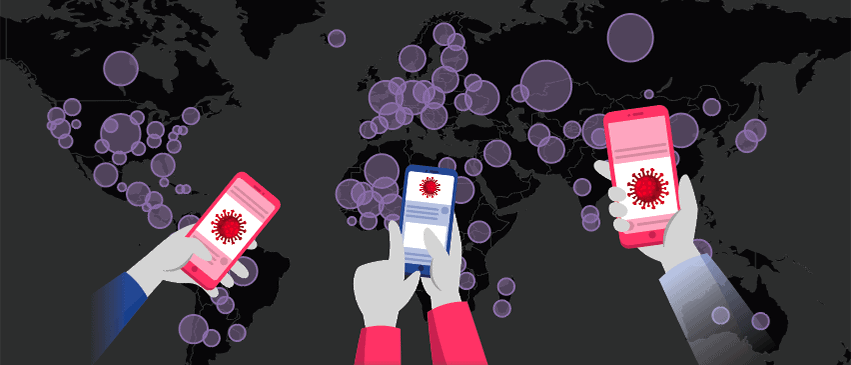Since its introduction, and throughout its exponential growth, the World Wide Web has presented paradoxically competing visions. “Netizens” of the Internet and early web insisted on decentralization and anonymity—two forces which democratized control over content and participation. But commercialization, network consolidation and targeted marketing quickly overwhelmed those egalitarian stances.
Its founders and early adopters trumpeted the World Wide Web as the ultimate platform for the widespread distribution of creativity by putting the means of production and distribution into the hands of the people. Soon enough, however, professionalized content creation and distribution returned as the norm and in some ways made life for small-scale and independent artists more difficult than it was before the Internet.
The COVID-19 Dilemma
Now we face another seemingly intractable dilemma: We need to decide if the advantages offered by tracking and surveillance are sufficiently valuable to justify giving up our privacy. The COVID–19 virus pandemic presents an existential challenge for decision-making about personal privacy.
On one hand, so-called “contact tracing” is a tried-and-true tactic of epidemiological science. Data collection that identifies our physical and social networks offers scientists, medical providers and governmental decision-makers valuable insights toward containing, controlling and defeating this unique, rogue virus.
On the other hand, acquiring accurate and meaningful data for this decision-making requires and entails massive surveillance. This surveillance and data collection identifies not only locations, but specific contacts among people, groups and activities.
The collection and utilization of this data could be a significant boon to eradicating the virus and its effects. However, this information—and the practices that are used to build those data sets—can be easily turned toward nefarious purposes and outcomes.
Because surveillance and data collection in this new media environment largely happens out of the view and conscious control of everyday users, critical press reports and warnings from privacy advocates have had little effect on the populace. Everyday citizens may lack the depth of technical knowledge required to make informed decisions about these complex questions. Meanwhile, government officials and capitalists may be motivated toward sweeping data collection with only narrow constraints.
Privacy & Our Collective Consciousness
A cursory reading of contemporary headlines presents diametrically confusing alternatives:
- “Most Americans are not willing or able to use an app tracking coronavirus infections. That’s a problem for Big Tech’s plan to slow the pandemic.”
- “Lawmakers warn coronavirus contact-tracing is ripe for abusive surveillance.”
- “Editorial: In the battle against COVID-19, privacy can’t become collateral damage.”
- “Apple and Google detail bold and ambitious plan to track COVID-19 at scale.”
- “Smartphone location data can tell if people stay home during the pandemic. Experts worry users are sacrificing privacy for safety.”
Now the situation may have shifted. As months in quarantine, masked with social distancing, stretch into seasons, almost all of us have extensive, firsthand experience with online applications, networks and industry practices. Our collective consciousness about taken-for-granteds in the online environment has been raised.
Perhaps our concerns were actualized by a meeting that was “Zoom-bombed” or requests by health service providers to track and follow our behaviors after examinations or treatment. As we stay home, we read press reports and hear more discussions of privacy challenges on radio and television. Readers may be stunned, impressed or frightened (or all of the above) when viewing interactive TrackCorona maps or other visualizations which clearly demonstrate the fine-grained level of specificity with which mobile phone users are tracked.
Further, privacy concerns appeal to people on both sides of the political spectrum. Many conservatives are concerned about governmental overreach. Many liberals are concerned about income inequities and wealth acquisition driven by the fruits of personal data collection and targeted marketing. Perhaps the current moment offers fertile ground for rational and in-depth conversations about the rightful role of privacy in contemporary American society.
 A Choice of Futures
A Choice of Futures
Two competing narratives offer a choice of alternatives for our future:
- Surveillance becomes even more ubiquitous and is accepted as “just the way it is and the way it has to be.” Americans acquiesce to a surveillance state based on their perception of the benefits and lack of caring about the downsides. Under this model, a Chinese-style system prevails. While this level of surveillance might be difficult for Americans to imagine, the Chinese “reputation system” is not unlike the ways Americans currently review products and services on Amazon and “like” each other’s comments on Facebook. Little changes in this narrative—especially once we emerge and “go back to normal.” Massive amounts of surveillance and capitalistic use of personal data continue. Some folks don’t like it, while others don’t much mind.
- Americans demand that elected officials and the tech industries do more to protect individual privacy, now and in the future. Under this model, Americans are appalled by the massive scale and accuracy of tracking and data collection they see from COVID-19 reporting, and they pull back from allowing their data to be used so freely.
Aided by the invisible hand of the government and industry leaders, citizens may become empowered to retake control over their personal privacy and data. We will learn which narrative “wins” as citizens “vote” with their online behavior. They will either make informed choices about applications, websites and privacy settings, or continue acting as if they are blissfully unaware of the risks to democracy posed by massive surveillance and data collection. Perhaps our collective fears of COVID-19 will mutate into a greater privacy awareness. PM
Edward Lee Lamoureux, PhD, is a professor in the Department of Interactive Media and Department of Communication at Bradley University. He is the author of Privacy, Surveillance, and the New Media You.




